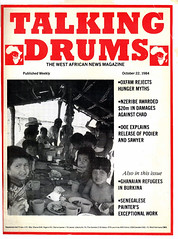Comment
Recovering From Rawlings
Mercifully the memories of mid 1982 to early 1984 are receding. The starvation that killed many, brutalized many others and degraded a whole nation might enter into folkloric history. The hunger that brought Ghana into the headlines repeatedly in the most unexpected parts of the world and brought new words and expressions into the vocabulary of Ghanaians has been much improved.
Food aid from the nations of the world helped to a great extent to avert a much greater disaster but it was the fact that so many people came so close to dying from hunger last year which brought the impetus that led so many people to cultivate food crops.
The people did their part in planting and nature responded by sending the rains. There is an abundance of maize and the problem now is one of storage. Having disclaimed responsibility for the hunger last year Flight- Lieutenant Rawlings and his friends stopped short of using the immortal words of another disastrous and self-imposed leader of Ghana, the late Mr Acheampong who also disclaimed responsibility for widespread hunger by protesting that he was not God to bring rain to the land - this time it was all simply blamed on the drought.
Now, however, the credit is all supposed to be for Flt- Lt. Rawlings and the big word in Ghana currently is RECOVERY. It is a measure of the scale of the tragedy that has become Ghana simply because people collapsing from hunger in the streets is no longer a common sight, the situation is regarded as something to cheer about.
The lowering of sights and aspirations has possibly been so effective that Ghanaians are now willing to settle for the lowest scale in human existence.
People are no longer aspiring towards an improvement in the quality of their lives, they are grateful enough that they and their families have a meal, any meal, the question is no longer what type of meal.
Only a sadist would have wished that there be no improvement on the chaos and mayhem that raged in Ghana at the height of the 'revolution' and any change that eases the hardship on the hapless Ghanaians must be welcomed.
It is important, however, that these things be placed in their proper perspective. The recovery or improvement in Ghana is relative to the damage that was caused by the 'revolution.' The food situation has improved compared to the starvation brought by the PNDC, it is still nowhere near the situation that existed in the country before the Rawlings intervention. The safety and security of the citizen has improved compared to the days when the PNDC's death squads roamed the streets at night and every soldier felt entitled to shoot 'reactionaries' but the fear had been brought by Flt-Lt. Rawlings in the first place.
It is sobering however to reflect that even in this 'improved' atmosphere, the exodus from Ghana still continues, driving some people to attempt crossing the Sahara desert on foot according to the Peoples' Daily Graphic.
We have stated on a number of occasions that the much vaunted 'economic recovery programme' introduced by the PNDC is the same as ex-President Hilla Limann was on the verge of introducing, which measures were regarded so objectionable and against the interest of the ordinary people that Fit-Lt. Rawlings felt compelled to stage his coup.
He and his colleagues on some occasions now sound embarrassingly as though their conversion to the market forces principles has been achieved with quite a vengeance.
Like all the 'come-latelys' who are not honest and brave enough to admit that they have been converted, they have been exhibiting the very ugly face of their newly acquired economic policy.
True to the secret undertakings given by Secretaries Kwasi Botchway and Joe Abbey, at the donors' conference in Paris last year, prices have been allowed to find their own levels leading to a situation whereby many imported goods are now available but at prices quite outside the reach of the ordinary person.
The Governor of the Bank of Ghana in his recent statement on the PNDC's economic policy made statements which have been considered treasonable by many members of the PNDC and which are quite contrary to what Flt-Lt. Rawlings had promised.
Words like 'private entrepreneurship,' profit motive, deregulation of prices, the trimming of the public sector and even privatisation of some parastatals are strangely no longer dirty words in Flt-Lt. Rawlings' 'revolutionary Ghana.'
Maize farmers are in danger of getting into debt. Because of the market forces it is not likely that they will be able to make enough money to pay for their costs. The 'born again' marketeers have not reached the point where they will give farmers guaranteed prices to protect them against bumper harvests. The Governor of the Bank of Ghana seems to think that because the maize farmers have made huge profits last year during the scarcity, they have to absorb the losses this year.
New converts do have a tendency to want to be purer than the pure, and that possibly explains why the PNDC does not feel the need to put a human face on their new economic policies. But it will be worthwhile for Fit-Lt. Rawlings to consider that if he was apprehensive about the existence of 'classes' in Ghana before, he has now succeeded in firmly establishing two classes - those who are managing in spite of him and those who are beginning to realise that they are not included in the calculations of the PNDC.
Some good might come out of it all though when more Ghanaians decide that Fit-Lt. Rawlings is irrelevant to their survival and treat him as a sick joke.
